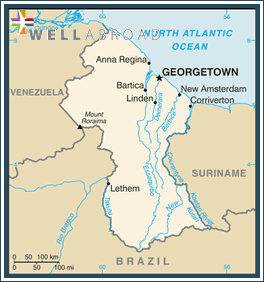|
MOST RECENT ALERTS
There's no recent alert.
|

|
|||||||||||||||
| COUNTRY OVERVIEW | ||||||||||||||||
|---|---|---|---|---|---|---|---|---|---|---|---|---|---|---|---|---|
|
| COUNTRY GENERAL INFORMATION | |||||||
|---|---|---|---|---|---|---|---|
| Language: |
English, Amerindian dialects,creole,Caribbian |
||||||
| Currency: | Guyanese dollar (GYD) | ||||||
| Predominant Religions: |
Christian 50%, Hindu 35%, Muslim 10%, other 5% |
||||||
| National Holidays: | Republic Day, 23 February (1970) | ||||||
| Economic Status: |
The Guyanese economy exhibited moderate economic growth in 2001-02. Chronic problems include a shortage of skilled labor and a deficient infrastructure. |
||||||
| Security: |
Guyana Defense Force: Army, Coast Guard, Air Corps |
||||||
| US Presence: |
U.S. Embassy in Georgetown |
||||||
| Document Requirements: |
A valid U.S. passport is required for U.S. citizens to enter and depart Guyana. On arrival, Guyanese Immigration normally grants U.S. visitors a stay of thirty days. U.S. citizens traveling to Guyana should ensure that their passports have at least six months of remaining validity. U.S.-Guyanese dual nationals may be granted an indefinite stay. Extensions of stay may be obtained from the Ministry of Home Affairs at 60 Brickdam Street, Georgetown. The Central Office of Immigration, located on Camp Street, Georgetown, must also note the extension in the visitor's passport. Travelers for purposes other than tourism should check with the Ministry of Home Affairs for information about requirements for work permits and extended stays. U.S.-Guyanese dual nationals departing Guyana for the United States using a Guyanese passport must present to Guyanese authorities a U.S. Certificate of Naturalization or other document establishing that they may legally enter the United States. For further information about entry, exit and customs requirements, travelers may consult the Embassy of Guyana at 2490 Tracy Place NW, Washington, DC 20008, telephone (202) 265-6900; the Consulate General in New York, or honorary consuls in California, Florida, Ohio, and Texas.Visit the Embassy of Guyana web site for the most current visa information. Information about dual nationality or the prevention of international child abduction can be found on our web site. For further information about customs regulations, please read our Customs Information sheet. |
||||||
| Major Airports: |
Airports: 90, Airports w/paved runways: 9 |
||||||
| Servicing Airlines: |
|
||||||
| Risks and Precautions: |
Politically motivated demonstrations and protests occasionally occur in Georgetown. Although protests in the past have not been directed at U.S. citizens and violence against Americans in general is rare, visitors should nevertheless remain alert and take prudent personal security measures to deal with the unexpected while in Guyana. Serious crime, including murder, home invasion, kidnapping, and carjacking continues to be a major problem. The murder rate in Guyana is three times higher than the murder rate in the United States. Armed robberies are increasing, especially in major business and shopping districts. Hotel room strong-arm break-ins are also increasing, so travelers should use caution when opening their hotel room doors. Four American citizens were murdered in Guyana in 2005. Travelers should avoid walking alone around Georgetown, even in the main areas and especially at night. Although bandits have attacked some taxis, they remain the safest means of getting about town for visitors. Only taxis from reputable companies should be used. Exercise constant vigilance. Do not dress ostentatiously. Do not carry valuables, large quantities of money, video cameras, or other obvious signs of wealth. There has been an increase in the number of muggings of British and North American nationals, and some have taken place in broad daylight. |
||||||
| Mortality Statistics: |
Infant MR total: 31.35 deaths/1,000 live births Life expectancy at birth: TOTAL 66.17 years (male 63.52/female 68.95.) |
||||||
| Immunization Indicators: |
Required: Yellow Fever Recommended: Malaria, Hep A & B, Rabies, Typhoid, Boosters: MMR, DPT |
||||||
| Infectious Disease Concerns: |
Dengue, filariasis, leishmaniasis, onchocerciasis, and American trypanosomiasis (Chagas disease) are other diseases carried by insects that also occur in this region. Epidemics of viral encephalitis and dengue fever occur in some countries in this area. Schistosomiasis can be contracted in fresh water in this region. |
||||||
| Overall Quality of Medical Services: |
Medical care is available for minor medical conditions. Emergency care and hospitalization for major medical illnesses or surgery is limited, due to a lack of appropriately trained specialists, below standard in-hospital care, and poor sanitation. Ambulance service is limited to transportation without any medical care and is frequently not available for emergencies. A recently installed MRI (linked to the US for interpretation) is now operational but results may take up to 4 days. |
||||||
| Providers in Network: |
|
||||||
| Recent Medical Threats/ Concerns/Warnings: |
Special attention should be paid to HIV/AIDS in Guyana. In addition to infection rates as high as 45% in high-risk populations such as commercial sex workers, data from a World Health Organization study in 2006 estimate that 1.6% of the general population is infected with HIV; this is among the highest prevalence rates in Latin America and the Caribbean. |
||||||
| Communications Info: |
Country Calling Code: +592 Internet Country Code: .gy |
||||||






